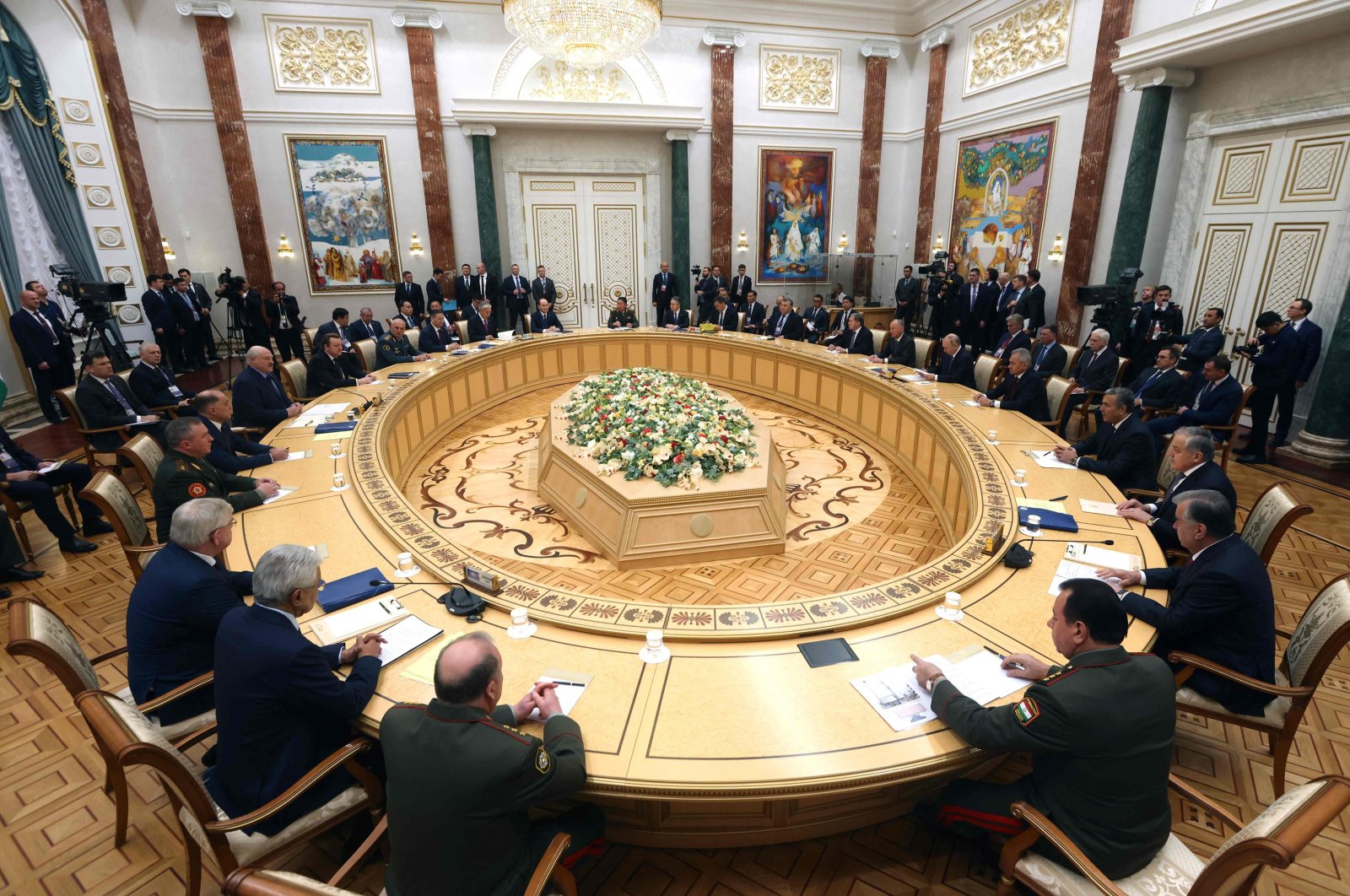
The head of the Collective Security Treaty Organization (CSTO) rejected claims that there had been discussions on the withdrawal of Armenia, which did not take part in the bloc's meeting in Minsk on Thursday.
"There is currently no talk of the Republic of Armenia leaving the CSTO. The work of the Armenian side in the organization continues, multilateral contacts within the CSTO are ongoing," Secretary-General Imangali Tasmagambetov told reporters in the Belarusian capital.
Tasmagambetov participated in the alliance's Collective Security Council meeting, along with the presidents of Russia, Belarus, Kazakhstan, Kyrgyzstan and Tajikistan. The Armenian prime minister did not attend.
Meanwhile, CSTO's contacts with its "natural partners" such as the Shanghai Cooperation Organization (SCO) and the Commonwealth of Independent States (CIS) have developed, Russian President Vladimir Putin said.
Addressing the military alliance's Collective Security Council meeting in Minsk, Putin said the Belarusian chairmanship and members actively worked to strengthen ties within the bloc in the past year.
Expressing that it was done based on the "principles of respect and consideration of each other's interests," Putin said positions on current political and military-strategic issues, as well as pressing problems on the regional and international agenda, were agreed upon through interaction at various levels.
"I would especially note the joint efforts being made to improve the collective rapid deployment and operational response forces, aviation and peacekeeping forces of the CSTO," he added.
The Russian leader said measures have been taken by the bloc to maintain combat readiness, improve command and control systems and increase the training of military personnel, especially pointing out recent military exercises in Belarus and Kyrgyzstan.
"Cooperation between intelligence services and law enforcement agencies has been consistently strengthened," he said, adding that he agreed with his Kazakh counterpart Kassym-Jomart Tokayev's assessment that their countries "do not accept terrorism in any of its manifestations and in any regions of the world."
"It is very important that joint activities within the CSTO contribute to the unity of our states and peoples, preserving the memory of our common history and achievements," he said, indicating that the next meeting is scheduled for December in St. Petersburg.
The CSTO is made up of Russia, Kazakhstan, Kyrgyzstan and Tajikistan, along with Armenia and Belarus.
Kremlin regrets Armenia's absence from CSTO meeting in Minsk
Russia regrets the absence of Armenian representatives at the summit of the Collective Security Treaty Organization (CSTO) in Minsk, Kremlin spokesman Dmitry Peskov said on Thursday.
The attendees of the CSTO summit exchanged views on Armenia's recent steps towards the security alliance, Peskov told reporters on the sidelines of the meeting.
"Of course, the CSTO is interested in Armenia continuing its participation. We hope Armenia does not change the vector of its foreign policy, Armenia remains our ally, our strategic partner -- both bilaterally and in terms of interaction in multilateral formats. We will continue to talk to them," he said.
The CSTO is made up of Russia, Kazakhstan, Kyrgyzstan and Tajikistan, along with Armenia and Belarus.
The CSTO is a Russia-led military bloc, uniting the six former Soviet countries.
Addressing the situation in the Gaza Strip, where Israel has killed more than 14,500 people since the Oct. 7 attack by Palestinian group Hamas, Tasmagambetov said "the organization unambiguously stands for a cease-fire."
The Middle East has always been afflicted by the tensions and conflicts, but the current confrontation overshadows the past differences, he added.
"Boundless violence, thousands of victims, including a huge number of children and women, this can in no way be justified by either political or ideological interests," he stressed.
An agreement, effective from Friday, has been struck under which Hamas would free 50 hostages held in Gaza, in exchange for a four-day humanitarian pause and the release of 150 Palestinian prisoners from Israeli jails.
Israel estimates that at least 239 Israelis are being held by Hamas following the cross-border attack by the Palestinian group on Oct. 7.
Israel has launched relentless air and ground attacks in the Gaza Strip following the Hamas attack, killing more than 14,500 Palestinians, including over 6,000 children and 4,000 women, according to health authorities in the enclave.
Thousands of buildings, including hospitals, mosques and churches, have also been damaged or destroyed in Israel's attacks on the besieged enclave.
The Israeli death toll, meanwhile, is around 1,200, according to official figures.
